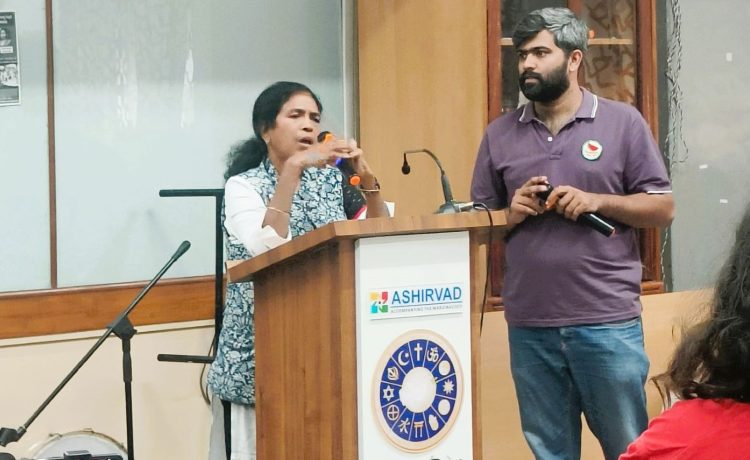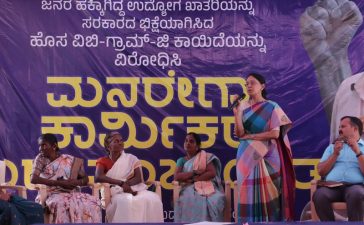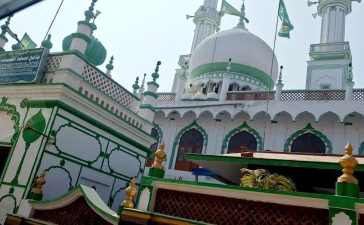Operation Kagar: A War on Adivasis or a War for Resources?
Public Meeting in Bengaluru Condemns Militarisation and Calls for Peace Talks
Bengaluru, August 23, 2025 – The Karnataka Peoples Forum Against War on Adivasis held a public discussion condemning Operation Kagar, a military offensive in central India, terming it a “war on Adivasis and their land.” Activists, academics, and rights groups alleged that the operation, masked as a counter-insurgency drive, has resulted in the deaths of more than 500 Adivasis and is primarily aimed at facilitating corporate access to mineral-rich forests.
“Twin Dangers: Corporate Capitalism and Communalism”
Introducing the programme, Prof. Nagaragere Ramesh of the People’s Democratic Forum warned that India today faces the combined dangers of “corporate capitalism and communalism.” He linked Operation Kagar to resource exploitation, citing the recent victory of Devanahalli farmers against land acquisition as an example of people’s resistance.
“It is high time the country raises its voice against attacks on our Adivasi brothers and sisters,” Ramesh said. “Operation Kagar is nothing but an assault on their lives and dignity.”
“Nothing Less Than a Genocide”
Renowned Bastar activist Soni Sori delivered an emotional account, comparing Operation Kagar to earlier military offensives like Operation Greenhunt and Salwa Judum. She described the situation as a “genocide” and highlighted the sexual violence, fake encounters, and systemic repression faced by Adivasi communities.
“Families are not informed when their loved ones are killed; corpses are buried in mass graves,” she said. “Children in the womb hear the death cries of their fathers. This is not a fight for money or status, but for survival and human rights.”
Sori warned that unless the “tyranny on Adivasis stops,” resistance will only grow stronger across the country.
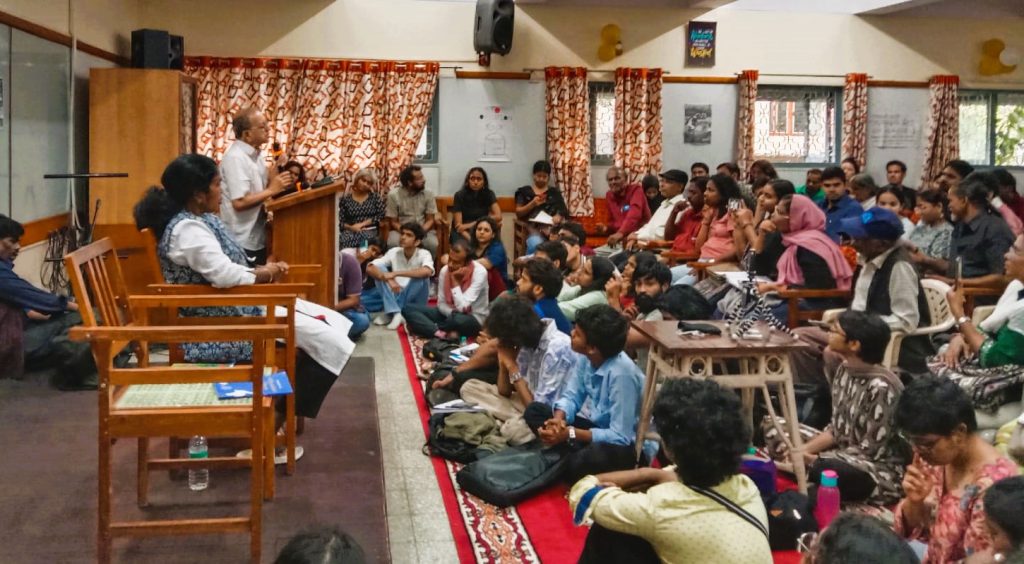
State Violence vs. Constitutional Rights
Prof. G. Hargopal of the Coordination Committee for Peace drew parallels between Chhattisgarh’s militarisation and earlier crackdowns in Andhra Pradesh. He warned that state violence, once normalised, cannot be contained.
“We trust the State because its use of force is meant to be bound by law,” he said. “But in Chhattisgarh, weapons are used recklessly, outside the law, with impunity. At that point, there is no difference between State violence and private violence.”
He reminded the audience that Adivasis have been fighting for over two centuries – from Birsa Munda’s rebellion to present-day struggles – for land, forests, and co-existence, not for profit. Referring to Schedule 5 of the Constitution, he stressed that forest land cannot be taken without the consent of tribal communities, yet this safeguard has been routinely violated.
Peace Talks and Democratic Space
Hargopal emphasised that genuine peace requires dialogue, not repression. Drawing from Andhra Pradesh’s history of peace negotiations, he said:
“Peace is not a graveyard, peace is life! The first step is a ceasefire, followed by addressing land reforms, democratic rights, and corporate MoUs.”
He also warned that democracy itself is under threat, with institutions like the judiciary, Election Commission, and media increasingly weakened. “When violence is normalised in one region, it spreads everywhere,” he cautioned, linking the struggle in Chhattisgarh to broader democratic concerns.
Coalition of Voices
The event was jointly organised by over 30 organisations including Adivasi Sangharsh Morcha, People’s Union for Civil Liberties, Dalit Sangharsh Samithi, All India Students Association, Fridays for Future–Karnataka, and several grassroots collectives. Together, they vowed to continue mobilising support for Adivasis and demanded an end to Operation Kagar.
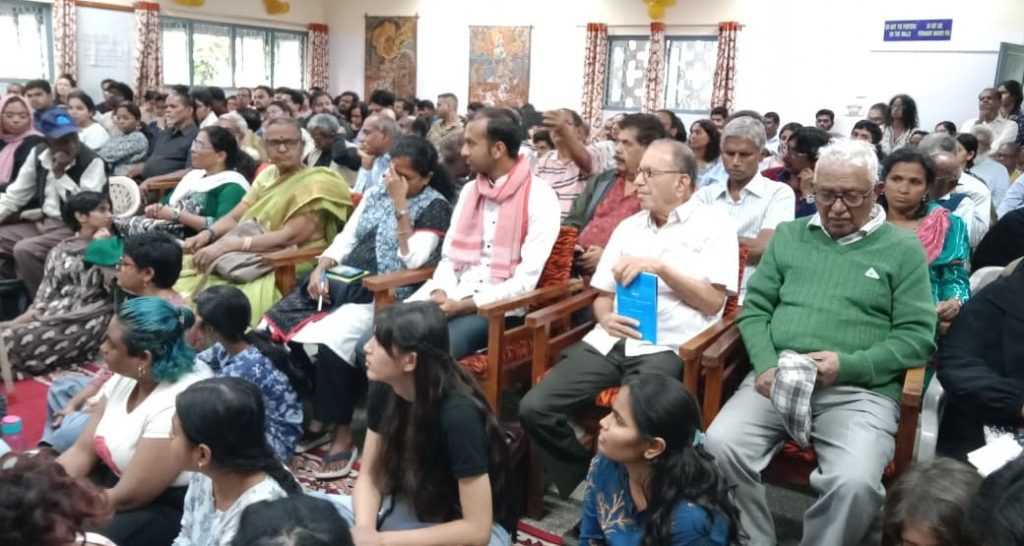
Analysis
The discussions at this forum reveal three central themes:
-
Resource Exploitation – Operation Kagar is viewed as a tool for enabling corporate mining in Adivasi lands.
-
Systematic Violence – From mass killings to sexual violence, testimonies point to systemic targeting of Adivasis.
-
Erosion of Democracy – The militarisation of central India is linked to the weakening of democratic institutions and rights across the country.
What emerges is a call for India to re-examine its developmental model and uphold constitutional protections for indigenous communities.
🔹 Impactful Quotes
-
Prof. Nagaragere Ramesh: “Corporate capitalism and communalism are the twin dangers of our time. Operation Kagar is nothing but an assault on Adivasi lives and dignity.”
-
Soni Sori: “Children in the womb hear the death cries of their fathers. This is nothing less than genocide – a war on Adivasis.”
-
Soni Sori: “Adivasis are not fighting for profit or power. They are fighting for survival, forests, and basic human rights.”
-
Prof. G. Hargopal: “When the State uses weapons recklessly, outside the law, there is no difference between State violence and private violence.”
-
Prof. G. Hargopal: “Peace is not a graveyard. Peace is life – and it begins with dialogue, not bullets.”
🔹 Q&A
Q: What is Operation Kagar?
A: A counter-insurgency operation in central India, officially against Maoists, but activists allege it is primarily aimed at clearing Adivasi lands for mining and corporate projects.
Q: How many have been affected?
A: Over 500 Adivasis and combatants have reportedly been killed, with widespread displacement, mass burials, and sexual violence reported.
Q: Why are activists calling it a “war on Adivasis”?
A: Because entire communities – including women and children – are targeted. Villages are destroyed, forests grabbed, and constitutional rights ignored.
Q: What do the campaigners demand?
A: An immediate ceasefire, peace talks, protection of Adivasi rights under Schedule 5 of the Constitution, and a halt to corporate land grabs.
Q: What is the larger implication for democracy?
A: Speakers warned that militarisation erodes democratic institutions and normalises violence, which could spread across India.
📌 Fact Sheet: Operation Kagar & The War on Adivasis
1️⃣ What is Operation Kagar?
A military offensive in Central India, officially against Maoists – but activists allege it is a cover for land grab and mining projects.
2️⃣ Casualties So Far
Over 500+ Adivasis and combatants killed; many others displaced, jailed, or subjected to fake encounters.
3️⃣ Targeting Communities
Entire villages destroyed. Families not informed when people are killed – corpses buried in mass graves.
4️⃣ Violence Against Women
Reports of sexual violence, rape, and torture of Adivasi women under custody and during raids.
5️⃣ Genocide in Disguise
Activist Soni Sori calls it “nothing less than genocide” – a systematic attack on Adivasi survival.
6️⃣ Rights Violated
Under Schedule 5 of the Constitution, tribal consent is required before entering forest lands – but this safeguard has been ignored.
7️⃣ Corporate-Political Nexus
Operation Kagar is seen as enabling corporate mining and deforestation, benefiting private companies at the cost of Adivasi lives.
8️⃣ Voices from the Forum
-
Prof. Nagaragere Ramesh: “Corporate capitalism & communalism are the twin dangers India faces today.”
-
Prof. G. Hargopal: “Peace is not a graveyard. Peace is life – and it begins with dialogue, not bullets.”
9️⃣ Democracy at Stake
Speakers warned that militarisation erodes democracy, weakens institutions, and normalises violence across India.
🔟 Demands from the Forum
-
Immediate ceasefire & peace talks
-
Protection of Adivasi land, forests, and rights
-
Withdrawal of corporate land grab projects
-
End to state-sponsored violence in tribal regions
![]()

